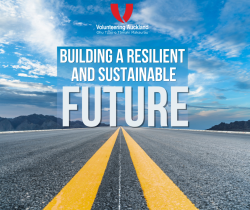Building Resilience and Sustainability: Key Strategies for Volunteer-Involving Programmes

The volunteer sector plays a crucial role in supporting communities, delivering essential services, and addressing social issues. However, the challenges posed by economic uncertainties, environmental changes, and global crises like the COVID-19 pandemic have highlighted the need for resilience and sustainability in volunteer-involving programmes.
To continue making a positive impact, volunteer organisations must adopt strategies that ensure their programmes are adaptable, robust, and capable of thriving in the face of adversity.
This article explores how the volunteer sector can build resilience and sustainability to safeguard the future of their initiatives.
1. Diversifying Funding Sources
Financial stability is fundamental to the resilience and sustainability of volunteer-involving programmes. Relying on a single source of funding, such as government grants or donations from a few large donors, can make organisations vulnerable to economic shifts and funding cuts. To mitigate this risk, volunteer organisations should diversify their funding sources.
This can be achieved through a mix of government funding, corporate partnerships, individual donations, fundraising events, and social enterprise activities. By cultivating relationships with a broad range of donors and supporters, organisations can reduce their dependency on any one source and create a more stable financial base. Additionally, developing a strong online presence and leveraging digital fundraising tools can expand an organisation’s reach, attracting new supporters and funding opportunities.
2. Strengthening Volunteer Management and Training
A resilient volunteer-involving programme relies on well-trained and effectively managed volunteers. Investing in volunteer management systems and training is essential to building resilience. Leaders of volunteers play a critical role in recruiting, training, and retaining volunteers, ensuring they are equipped with the skills and knowledge needed to perform their roles effectively.
Organisations should provide comprehensive training programmes that cover both the specific tasks volunteers will perform and broader skills such as leadership, communication, and problem-solving. Ongoing training opportunities, such as workshops, webinars, and mentoring, can keep volunteers engaged and help them develop new skills. By investing in their volunteers, organisations not only enhance the quality of their programmes but also build a more committed and capable volunteer workforce that can adapt to changing circumstances.
3. Developing Strong Leadership and Governance
Effective leadership and governance are critical to the sustainability of volunteer-involving programmes. Leaders set the vision, strategy, and culture of the organisation, and strong governance ensures that resources are used effectively, and risks are managed appropriately. To build resilience, volunteer organisations must invest in developing strong leadership at all levels, from the board of trustees to leaders of volunteers.
This includes recruiting board members with diverse skills and perspectives, providing leadership training and development opportunities, and fostering a culture of transparency, accountability, and collaboration. Strong governance structures, including clear policies, procedures, and risk management frameworks, can help organisations navigate challenges, make informed decisions, and maintain the trust of their stakeholders.
4. Fostering Community Partnerships and Collaboration
Collaboration and partnership are key to building resilience and sustainability. By working together, organisations can share resources, knowledge, and expertise, and address complex social issues more effectively. Partnerships can also open up new funding opportunities, increase the visibility of volunteer programmes, and provide volunteers with diverse and meaningful roles.
Volunteer-involving organisations should seek to build strong relationships with other non-profits, community groups, businesses, and government agencies. Collaborative initiatives, such as joint projects, shared services, and community networks, can enhance the impact of volunteer efforts and create a more integrated and supportive volunteer sector. Additionally, engaging with local communities and stakeholders can help organisations understand their needs, build trust, and ensure that their programmes are relevant and responsive.
5. Embracing Innovation and Flexibility
The ability to innovate and adapt is essential for resilience. Volunteer-involving organisations must be open to new ideas, approaches, and technologies that can enhance their programmes and make them more effective. This includes embracing digital tools and platforms that can streamline volunteer management, improve communication, and expand outreach.
Organisations should also be flexible in their approach to volunteering, offering a range of opportunities that cater to different interests, skills, and time commitments. This may include traditional, in-person volunteering, as well as virtual and micro-volunteering options that allow people to contribute in short, flexible bursts of activity. By providing diverse and accessible volunteer opportunities, organisations can engage a broader audience and respond to the changing needs and preferences of volunteers.
6. Prioritising Volunteer Well-being and Support
Volunteer well-being is a critical component of sustainability. Volunteers who feel supported, valued, and motivated are more likely to stay engaged and committed to the organisation. To build resilience, volunteer-involving programmes must prioritise the well-being of their volunteers, ensuring they have the support and resources they need to thrive.
This includes providing regular feedback and recognition, offering opportunities for social interaction and connection, and creating a supportive and inclusive environment. Organisations should also be aware of the potential for volunteer burnout and take proactive steps to prevent it, such as setting realistic expectations, offering flexible roles, and providing mental health support.
7. Measuring Impact and Demonstrating Value
To build sustainability, volunteer-involving organisations must be able to demonstrate the impact and value of their work. This requires effective monitoring and evaluation systems that track the outcomes of volunteer activities and measure their contribution to the organisation’s goals. By collecting and analysing data, organisations can assess the effectiveness of their programmes, identify areas for improvement, and make informed decisions.
Demonstrating impact is also important for securing funding and support. By clearly communicating the benefits of their work to funders, donors, and stakeholders, organisations can build credibility, attract new supporters, and strengthen their case for investment. Sharing success stories, impact reports, and case studies can highlight the positive difference that volunteers make and inspire others to get involved.
Conclusion: Building a Resilient and Sustainable Volunteer Sector
The future of volunteering depends on the ability of organisations to adapt to new challenges, embrace innovation, and build resilience. By diversifying funding sources, strengthening volunteer management, fostering partnerships, embracing flexibility, prioritising well-being, and demonstrating impact, volunteer-involving programmes can create a sustainable and thriving future. As the volunteer sector evolves, these strategies will be essential in ensuring that volunteer efforts continue to make a meaningful and lasting impact in communities around the world. Through resilience and sustainability, the volunteer sector can remain a vital force for positive change, enriching lives and building stronger, more connected communities.

